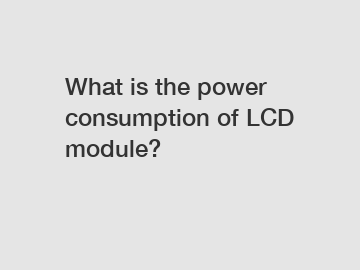What is the power consumption of LCD module?
What is the power consumption of LCD module?
LCD modules are commonly used in a variety of electronic devices, from smartphones and tablets to televisions and computer monitors. These modules provide a high-quality visual display by using liquid crystals that can be manipulated electrically to control light transmission. One crucial aspect to consider when using LCD modules is their power consumption. In this article, we will explore the factors that affect the power consumption of LCD modules and how it influences device battery life.
Understanding LCD module power consumption.

LCD modules operate by backlighting the liquid crystals to create the displayed image. The backlighting system typically accounts for the majority of power consumption in an LCD module. The backlight is usually composed of one or more cold cathode fluorescent lamps (CCFL) or light-emitting diodes (LED).
Secondary Heading: Factors affecting power consumption.
Various factors influence the power consumption of LCD modules. Here are the key elements to consider:
1. Screen size: Generally, larger LCD modules require more power to illuminate the backlight evenly. This means that devices with larger displays, such as televisions, tend to consume more power compared to smaller devices like smartphones or smartwatches.
2. Backlight type: The type of backlight used in an LCD module can significantly impact its power consumption. Traditional CCFL backlights consume more power compared to modern LED backlights. LED backlights are more energy-efficient and provide better control over brightness levels, resulting in lower overall power consumption.
3. Brightness settings: The brightness level of an LCD module contributes directly to its power consumption. Higher brightness settings require more power to illuminate the backlight, while lower brightness settings consume less power. Adjusting the brightness level according to ambient lighting conditions can help optimize power usage.
4. Content displayed: The type of content displayed on an LCD module can affect power consumption. Screens that predominantly display darker or black content consume less power compared to screens displaying brighter or white content. This is because darker pixels require less backlight illumination.
Secondary Heading: Impact on device battery life and power management.
The power consumption of an LCD module directly affects the battery life of devices. Devices with LCD modules typically have to balance display quality and battery life. Manufacturers employ various power management techniques and optimizations to extend battery life while maintaining satisfactory display performance.
To preserve battery life, devices may incorporate features like automatic brightness adjustment and screen timeout settings. Automatic brightness adjustment uses ambient light sensors to optimize the backlight brightness according to the surrounding environment. Screen timeout settings automatically turn off the display after a period of inactivity to conserve power.
Displaying static images for extended periods can lead to screen burn-in, which can degrade the performance and lifespan of LCD modules. To prevent this, devices may automatically dim or turn off the backlight after a certain period of screen inactivity.
Conclusion:
In conclusion, the power consumption of LCD modules is a critical consideration in electronic devices. Factors such as screen size, backlight type, brightness settings, and content displayed influence the power consumption. Optimizing these factors can help extend battery life and enhance the overall user experience.
If you have any further questions or would like to learn more about LCD modules and their power consumption, please do not hesitate to contact us.
Want more information on Fuel Dispenser Liquid Crystal Module, HTN Gas Meter LCD China, Dianguang? Feel free to contact us.


